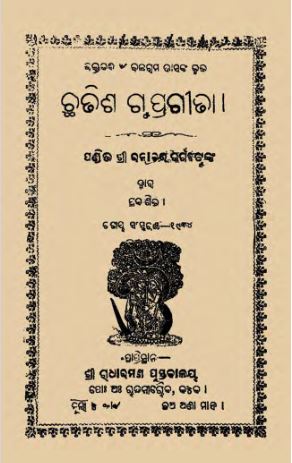In the rich tapestry of Odia literature, certain works stand out not just for their thematic essence but also for their profound impact on the cultural and literary landscape. One such significant piece is “Chhatis Guptagita,” penned by the celebrated poet Balaram Das and published in 1934. This collection of poetry is a poetic exploration of spirituality, human emotions, and existential queries, resonating with themes that are as relevant today as they were during its inception.
Balaram Das, a notable figure in Odia poetry, was known for his ability to weave emotional depth with philosophical insights. “Chhatis Guptagita” showcases his mastery of the craft, presenting a series of poems that delve into the human condition, the mysteries of life, and the quest for spiritual enlightenment. The title itself suggests a hidden, esoteric wisdom, akin to the “Gita,” which delivers profound teachings through allegory and metaphor.
The structure of “Chhatis Guptagita” reflects a blend of classical and contemporary styles, drawing from traditional Odia forms while also embracing modern sensibilities. The poems are imbued with rich imagery, creating a vivid landscape that invites readers to immerse themselves in the experiences depicted. Each poem serves as a window into the soul, allowing readers to confront their own fears, aspirations, and spiritual longings.
One of the most striking features of “Chhatis Guptagita” is its exploration of the juxtaposition between the worldly and the divine. Das uses everyday experiences to illustrate deeper philosophical concepts, making his poetry relatable yet contemplative. For instance, in some verses, he delves into the struggles of love—both divine and earthly—that echo the longing for connection with the divine. This duality resonates with readers, encouraging them to reflect on their own lives and the relationships that shape their existence.
Moreover, the book stands out for its linguistic beauty. Das’s use of Odia idioms and expressions adds a lyrical quality that elevates the reading experience. The rhythm and flow of his verses captivate the reader, while the poignant themes invite introspection. His choice of words brings forth the natural beauty of Odisha, enhancing the evocative power of his poetry. The integration of nature in his verses further symbolizes the interconnectedness of life and spirituality, an essential component of his philosophical viewpoint.
“Chhatis Guptagita” also reflects the socio-political context of the 1930s in India. Emerging amidst the freedom struggle, the book embodies a spirit of resilience and hope. It speaks not only to the individual’s journey toward self-discovery but also to the collective yearning for liberation and justice. The poems can be interpreted as a call to awaken the inner strength to confront life’s adversities, making it a timeless read for anyone grappling with challenges.
In conclusion, Balaram Das’s “Chhatis Guptagita” is much more than a collection of poems; it is an exploration of life’s complexities through a spiritual lens. Its enduring relevance lies in its ability to resonate with universal themes of love, longing, and the search for meaning. As we delve into this remarkable work, we are reminded of the profound beauty of Odia poetry and its power to transcend time, inviting us to uncover the hidden verses within our own lives.
Books Info
| Books name | Chhatis Guptagita/ଛତିଶ ଗୁପ୍ତଗୀତା |
| Editor | Balaram Das |
| No Of pages | 104 |
| Publisher | NA |
| Publication | 1934, 3e. |
| Printed At | NA |
| Distributor | Sri Radharamana Pustakalaya |

